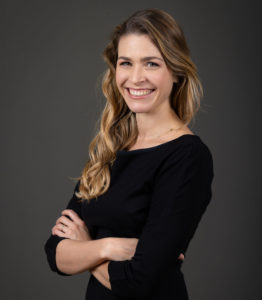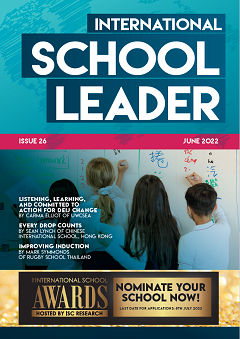By David Willows and Suzette Parlevliet
Living in the shadow of a global pandemic, it is hard to avoid articles about the school of the future. Covid-19 not only unsettled our daily routines but pushed us to look beyond the immediate horizon to what schools might be on the other side of this hugely disruptive event in our lives.
As members of the Advancement Team at the International School of Brussels, this question of what our school might be in the future was particularly relevant. For many years, we had worked together to ensure that the reputation of our school was strong, that the story of our school was being told and that people were able to find their place in the story of our school. But things were changing. Traditional forms of advertising no longer had the appeal they once had. New schools were providing alternative and sometimes cheaper pathways for students. In short, it was becoming more and more difficult to stand out in the crowd.
Experience strategy
It was in this context – which incidentally was being felt by colleagues in other schools around the world – that we started to reimagine the traditional roles of admissions, marketing and communications, as well as fundraising and alumni relations, around the concept of experience strategy.
Experience strategy, as a school of thought, can be attributed to the ground-breaking work of Joseph Pine and James Gilmore, The Experience Economy: Competing for Customer Time, Attention, and Money. Writing about the evolution of companies and industries, Pine and Gilmore argue that, whereas in the past we competed on the basis of the products we made or the services we provided, we now live in an age of ‘experience’. Companies that want to be competitive today, they argue, need to think seriously about the experiences that they are deliberately designing for their customers.
Competing in the age of experience
Back to the school of the future. We realised that if Pine and Gilmore are right in their analysis of how to be competitive in the current market, we need to start thinking about how to apply insights from the world of experience strategy to our school.
It is impossible to capture every element of our journey in this short article, so instead we have summarised eight key lessons that we have learned along the way, in the hope that they may help you begin to reframe how you see the experience of your own school.
- Everyone is on a journey. One way to start thinking through the lens of experience strategy is to imagine that everyone in your school – students, parents, employees – is on a journey, from the first time they hear about your school to the moment they leave and join your community of alumni. We have broken down this journey into six stages and have called it the Lifecycle of School Experience.
- Experience cannot be left to chance. The next key principle in experience strategy is to understand that every stage of this journey should be intentionally designed rather than left to chance. Think about the difference between a mediocre theme park and a Disney attraction park. In the latter, every aspect of your journey has been carefully planned to ensure that you are constantly surprised and delighted by the experience.
- You don’t remember everything. Research shows that there is a difference between what we experience (in the course of any one day we experience thousands of different micro-events) and what we actually remember. In fact, we tend to remember the ‘peak’ (the high point) and the end. This lesson, on its own, has helped us think a lot about how to design a powerful admissions experience for prospective families visiting the school.
- Moments matter. When we map the journey of customers or our families in our school, there is much that can feel ordinary and mundane. Even in a Disney park you have to queue! As a counterbalance, experts in experience strategy will often create powerful moments that spark excitement, joy, surprise and wonder. Schools too have the potential to create these standout occasions at every stage of the lifecycle. They really do make a difference!
- Word of mouth is still critical. There is a tendency right now for schools to think more about digital strategy than the power of word-of-mouth marketing. But the research shows us that only 7–10% of all word of mouth is online and when we post something on social media, it is likely that only 1–2% of your followers see the content you post. Experience strategy teaches us, however, that if you focus on surprising and delighting your current families, they will be your brand ambassadors for much longer than any advertising campaign.
- Everyone plays a role in the experience. This is a short lesson, but an important one. There is no one in your school who is not part of building the experience of your school. Everyone has a role, even if there is a designated team (in our case, Advancement) responsible for ensuring that the experience is held together as one.
- It is important to find your edges. Experience strategy ‘edges’ represent the lines that frame and define the unique experience of our school. But in determining what makes us different, we should absolutely avoid edges that your competition is already excelling at. In other words, if our schools are going to stand out in an already overcrowded market, we should have the courage to find an edge that is different rather than more of the same.
- There is life beyond the NPS. The traditional way that companies (and some schools) have measured ‘experience’ is via the Net Promoter Score (NPS). NPS asks customers to rate on a scale of 1–10 how likely they are to recommend a service or product to someone else. The NPS score is calculated by subtracting the detractors (those scoring 1–6) from the promoters (those scoring 9–10). However, there is so much exciting work being done now that takes us far beyond this one-dimensional metric and allows us to measure the felt experience of families in our schools.
We believe that the school of the future will be one in which we start to apply these lessons and intentionally design the experience for families. As we embark on our own journey with [YELLOW CAR], these are some of the insights that we will take with us when supporting other schools around the world.


Dr David Willows and Suzette Parlevliet are co-founders of [YELLOW CAR], a training and consultancy firm designed to help schools stand out. Previously, both David and Suzette led the Advancement team at the International School of Brussels, Belgium. Connect with David and Suzette on LinkedIn


